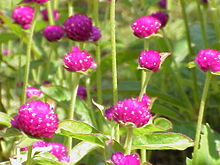Gomphrenoideae
| Gomphrenoideae | |
|---|---|
 |
|
| Gomphrena globosa | |
| Scientific classification | |
| Kingdom: | Plantae |
| Clade: | Angiosperms |
| Clade: | Eudicots |
| Order: | Caryophyllales |
| Family: | Amaranthaceae |
| Subfamily: |
Gomphrenoideae Schinz |
| Genera | |
|
about 13 genera, see text |
|
about 13 genera, see text
The Gomphrenoideae are a subfamily of the Amaranthaceae.
The stamens have anthers with only one lobe (locule) and two pollen sacs. Many species show C4-photosynthesis pathway.
The center of diversity lies in Central America, Mexico and the dry forests and thorn bush savannas of South America.
The subfamily Gomphrenoideae was first published in 1893 by Hans Schinz (in: Engler und Prantl (Eds.): Die Natürlichen Pflanzenfamilien vol. 3, 1a, p. 97).
According to phylogenetic research by Sanchez Del-Pino (2009), the subfamily Gomphrenoideae Schinz is regarded as a monophyletic taxon with 19 genera and about 300-400 species. The traditional classification with two tribes (Gomphreneae and Pseudoplantageae) does not reflect the phylogenetic relationship in this group. Three clades can be recognized.:
Iresinoids:
Iresine lindenii
Alternantheroids: Alternanthera caracasana
Alternantheroids:
Tidestromia lanuginosa
Gomphrenoids: Gomphrena serrata
Gomphrenoids:
Pfaffia glomerata
...
Wikipedia
